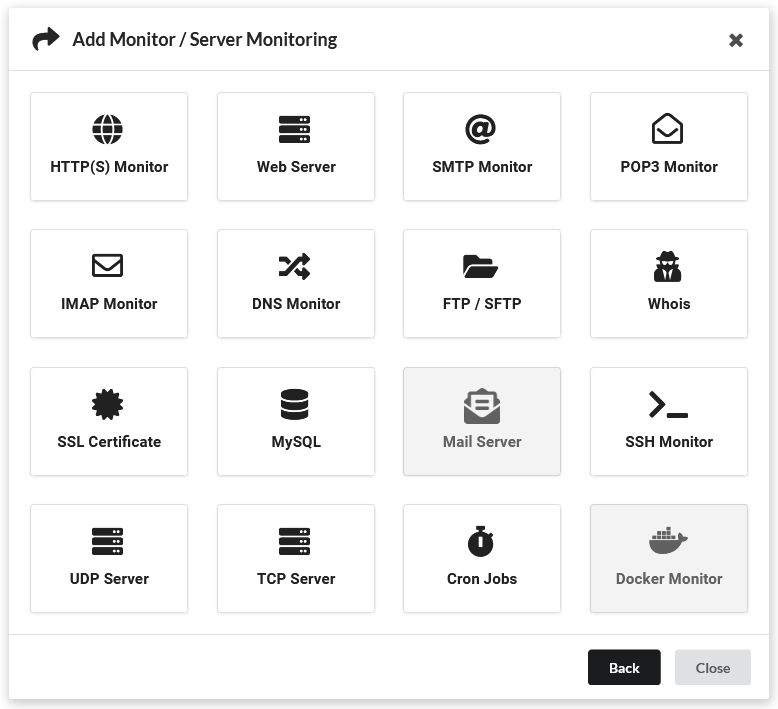Server Monitoring
Welcome to the Server Monitoring Documentation section of Upzilla’s uptime monitoring service! In this comprehensive overview, we’ll explore the various monitoring checks available to ensure the reliability and performance of your servers. Let’s delve into each monitoring check.

The HTTP(s) Monitor checks the availability and performance of your web servers by sending HTTP requests and analyzing response codes and times. It ensures that your websites are accessible to users and alerts you to any issues that may affect their availability.
The Web Server Monitor assesses the health and performance of your web servers by monitoring various metrics such as CPU usage, memory usage, and disk space. It helps you identify potential bottlenecks or resource constraints that may impact server performance.
The SMTP Monitor verifies the availability and responsiveness of your SMTP (Simple Mail Transfer Protocol) servers by sending test emails and analyzing response times. It ensures that your email infrastructure is functioning correctly and alerts you to any issues that may affect email delivery.
The POP3 Monitor checks the availability and responsiveness of your POP3 (Post Office Protocol version 3) servers by connecting and retrieving test emails. It ensures that your email servers can receive incoming mail and alerts you to any issues that may affect email retrieval.
The IMAP Monitor evaluates the availability and responsiveness of your IMAP (Internet Message Access Protocol) servers by connecting and retrieving test emails. It ensures that your email servers can store and manage email messages and alerts you to any issues that may affect email access.
The DNS Monitor verifies the availability and responsiveness of your DNS (Domain Name System) servers by querying DNS records and analyzing response times. It ensures that your domain names can be resolved to IP addresses correctly and alerts you to any issues that may affect DNS resolution.
The FTP/SFTP Monitor checks the availability and responsiveness of your FTP (File Transfer Protocol) or SFTP (SSH File Transfer Protocol) servers by connecting and transferring test files. It ensures that your file transfer services are functioning correctly and alerts you to any issues that may affect file transfers.
The WhoIs Monitor monitors the availability and responsiveness of WhoIs servers by querying domain registration information. It ensures that you can retrieve accurate domain registration data and alerts you to any issues that may affect domain management.
The SSL Certificate Monitor evaluates the validity and expiration status of SSL/TLS certificates installed on your servers. It ensures that your websites are secure and alerts you to any certificates that are nearing expiration or have expired.
The MySQL Monitor checks the availability and performance of your MySQL databases by executing test queries and analyzing response times. It ensures that your databases are accessible and responsive and alerts you to any issues that may affect database operations.
The SSH Monitor verifies the availability and responsiveness of your SSH (Secure Shell) servers by establishing secure connections and executing test commands. It ensures that you can access and manage your servers securely and alerts you to any issues that may affect SSH access.
The UDP Server Monitor checks the availability and responsiveness of your UDP (User Datagram Protocol) servers by sending test packets and analyzing response times. It ensures that your UDP-based services are functioning correctly and alerts you to any issues that may affect UDP communication.
The TCP Server Monitor evaluates the availability and responsiveness of your TCP (Transmission Control Protocol) servers by establishing connections and analyzing response times. It ensures that your TCP-based services are accessible and alerts you to any issues that may affect TCP communication.
The Cron Jobs Monitor verifies the execution and responsiveness of scheduled cron jobs on your servers. It ensures that your cron jobs are running as expected and alerts you to any failures or delays in job execution.
Each monitoring check provides essential insights into the health and performance of your servers, enabling you to identify and resolve issues promptly. Whether it’s monitoring web servers, email infrastructure, database servers, or network services, Upzilla’s server monitoring checks offer comprehensive coverage to keep your servers running smoothly. If you have any questions or need assistance with setting up monitoring checks, please refer to our detailed documentation or reach out to our support team for assistance.